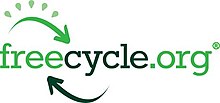
Back Freecycle Network Danish Freecycle German Freecycle Spanish Freecycle French Freecycle Italian Freecycle Portuguese The Freecycle Network SIMPLE Freecycle Serbian
 The Freecycle Network logo | |
| Abbreviation | TFN |
|---|---|
| Formation | 1 May 2003[1] |
| Legal status | 501(c)3 |
| Purpose | Reuse |
Region served | 121 countries[2] |
Membership | 6,880,991[3] |
Founder, executive director | Deron Beal[4] |
| Website | www.freecycle.org |
The Freecycle Network (TFN) is a private, nonprofit organization[5] registered in Arizona, US and is a charity in the United Kingdom.[6] TFN coordinates a worldwide network of "gifting" groups to divert reusable goods from landfills. The network provides a worldwide online registry, organizing the creation of local groups and forums for individuals and nonprofits to offer (or request) free items for reuse or recycling and to promote a gift economy.[7] In contrast, although flea markets and swap meets also contribute to the 3 Rs (reduce, reuse, recycle), they involve mainly buying and selling or bartering rather than gifting.
- ^ "Background - FreecycleFAQ". Wiki.freecycle.org. Retrieved 2016-05-04.
- ^ "The Freecycle Network". Archived from the original on 2011-04-23. Retrieved 2011-05-02.
- ^ "The Freecycle Network". Freecycle.org. Retrieved 2016-05-04.
- ^ "Leadership - FreecycleFAQ". Wiki.freecycle.org. 2016-02-04. Retrieved 2016-05-04.
- ^ "The Freecycle Network". Archived from the original on 2015-03-19. Retrieved 2015-03-18.
- ^ "Freecycle UK" is registered under charity number 1118148[permanent dead link] and its registration refers to uk.freecycle.org as its official website address.
- ^ Shah, Dhavan V; Nelson, Michelle R; Friedland, L.; Nelson, M. R. (2007). The politics of consumption/the consumption of politics. American Academy of Political and Social Science. Vol. 611. Sage, cop. p. 6. doi:10.1177/0002716207299647. ISBN 978-1-4129-5934-6. S2CID 144677793.
Nelson, Rademacher, and Paek explore the underpinnings of sharing and civic identity through a case study of consumers in a second-order, online consumption community: Freecycle.org. Results show that these individuals hold downshifting attitudes (favor less work and less consumption). Yet the downshifting does not necessarily mean increased civic engagement in a traditional sense. Rather, political and civic engagement for this group included political consumption and digital forms of political participation.
{{cite book}}:|journal=ignored (help)
© MMXXIII Rich X Search. We shall prevail. All rights reserved. Rich X Search